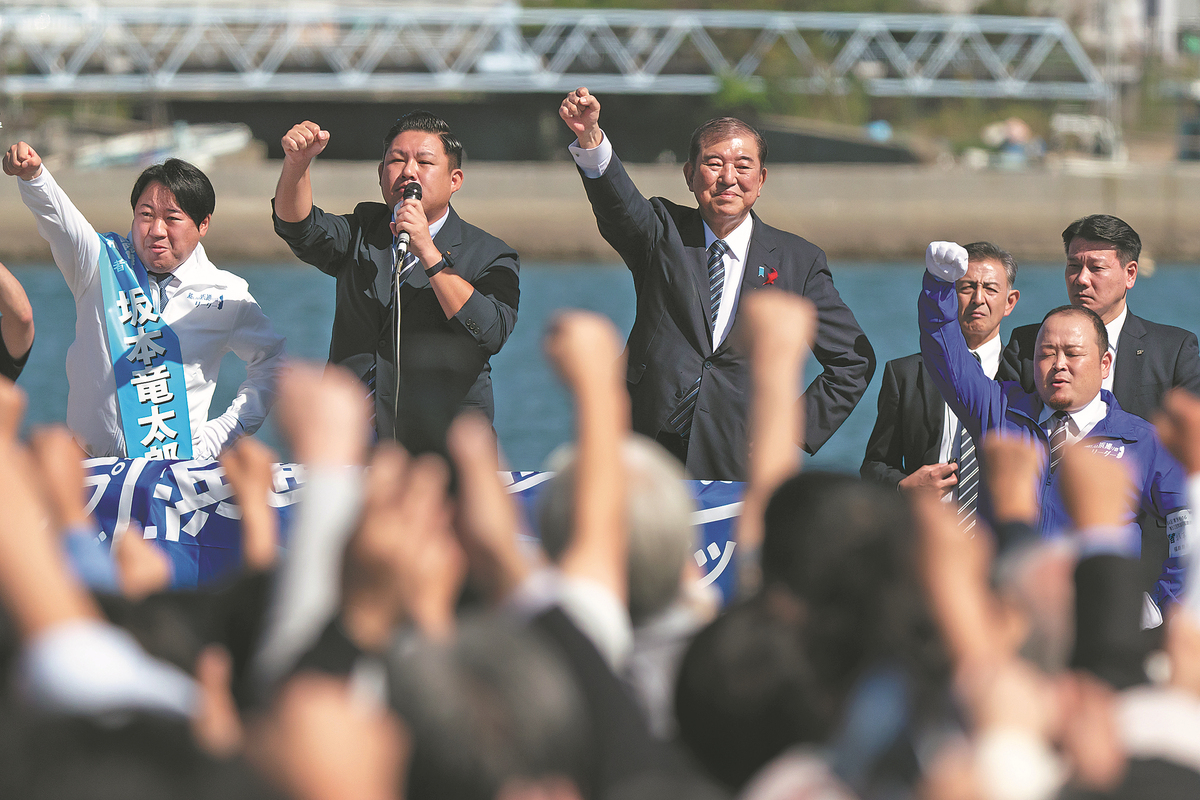Ishiba drops Asian NATO plans for now
Japan PM's security framework vision put on the back burner amid criticism


Japanese Prime Minister Shigeru Ishiba seems to have shelved his idea of an Asian version of the North Atlantic Treaty Organization amid widespread criticism and lack of support.
Ishiba did not discuss the topic during his first overseas trip after assuming office to Laos last week for the Association of Southeast Asian Nations Summit.
His vision for a NATO-like security framework in Asia has been criticized in Japan as well as in other Asian countries.
Ishiba has long pushed the idea of an Asian version of NATO. In a signed article for the Washington-based think tank Hudson Institute in September, before he was elected Japan's prime minister, Ishiba broached the idea again. He reiterated the stance of his predecessor Fumio Kishida, saying "Ukraine today is Asia tomorrow".
An Asian NATO, he claimed, would "unite" various security frameworks in the region, such as the US-Japan security alliance, the US-South Korea security alliance, the ANZUS security treaty among Australia, New Zealand and the US, and the Five Power Defense Arrangements among the Commonwealth nations of Australia, Malaysia, New Zealand, Singapore and the UK.
Observing the unease Ishiba's idea generated in the region, Japanese Foreign Minister Takeshi Iwaya denied any urgency to create an Asian version of NATO, describing Ishiba's proposal as something that could be considered in the future.
"The most ideal form of security cooperation in the future is the one that would not exclude any country in the region or Asia as a whole," Iwaya said at a news conference on Oct 2.
NATO was created during the Cold War by Western nations to counter the "common threat" of the Soviet Union.
"It is difficult to imagine a similar framework being established in Asia, which has a completely different geographical and historical background," the Japanese newspaper The Asahi Shimbun said in an editorial.
Kazuya Shimba, general-secretary of Japan's Democratic Party for the People, described Ishiba's Asian NATO vision as "abrupt "and said it would hinder Japan in its efforts to deepen cooperation with its allies and like-minded countries.
India's External Affairs Minister Subrahmanyam Jaishankar made it clear that India didn't share Ishiba's vision for an Asian NATO. "India has never been a treaty ally of another country," he said at an event at the Carnegie Endowment for International Peace in Washington.
Australian Prime Minister Anthony Albanese also rejected Ishiba's calls for an Asian regional security body similar to NATO, saying the idea was not raised at the ASEAN summit.
As the world's largest transnational military alliance, NATO has been active in the Asia-Pacific region and has developed partnerships with nations, including Japan, the Republic of Korea, Australia and New Zealand.
The bloc planned to open a liaison office in Tokyo in July 2023, when the Japanese government clarified the country had no intention of joining the alliance.
Opposed by China and France, NATO gave up the idea of a Tokyo office during last year's summit in Vilnius, Lithuania.
Lyu Yaodong, a research fellow with the Institute of Japanese Studies at the Chinese Academy of Social Sciences, said it is unlikely that Ishiba's Asian NATO vision will ever be realized.
"However, Ishiba will continue to attach great importance to Japan's defense policy, beef up the country's self-defense capability and upgrade army equipment in the name of coping with more severe security challenges," Lyu said.
Zero-sum mentality
Xiang Haoyu, distinguished research fellow at the China Institute of International Studies' Department for Asia-Pacific Studies, said the Asian NATO vision smacks of Cold War-like confrontation and zero-sum mentality.
"Ishiba may not have expected the strong opposition to his idea. He has not talked about it since he was inaugurated on Oct 1," Xiang said. "It looks like Ishiba is shelving the vision."
The ruling Liberal Democratic Party left out some of Ishiba's key policy ideas, such as the Asian NATO and a NATO liaison office in Tokyo, from its manifesto for the general election on Oct 27.
The campaigning for the 465-seat Lower House kicked off on Tuesday, as Ishiba, who took office as prime minister just over two weeks ago, put the issue of trust in the LDP into the hands of voters.
However, the Asian NATO idea may not be completely off the table. Before departing for Laos on Oct 9, Ishiba told reporters the idea was still being discussed in the LDP.
While Ishiba looks like he is stepping back for the moment, US Ambassador to Japan Rahm Emanuel continues to fan the flames. In an article in The Wall Street Journal published on Oct 9, Emanuel called for forming a NATO-like economic coalition in the region.
For the trade defense coalition to be effective, he suggested it would need the "economic equivalent" of NATO's Article 5 — an attack on one is an attack on all — at its "core".

































